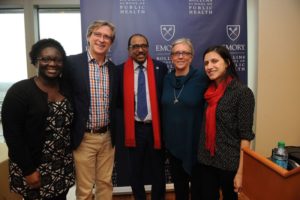Religion and Public Health at Emory

Members of the RPHC and IHP pose with Michel Sidibe, Executive Director of UNAIDS, at the Rollins School of Public Health, February 2017.
The inquiry into the ways in which religion and public health intersect has a vibrant presence at Emory University. Emory’s distinctive Department of Sociology and the Rollins School of Public Health provide the undergirding for the work of two Emory entities, the Religion and Public Health Collaborative and the Interfaith Health Program. These two programs study the relationship of religion and public health and its effects, both positive and negative, on the communities around the world, and they actively partner with one another through teaching, research, and service.
The Religion and Public Health Collaborative (RPHC) has its roots at Emory as part of Emory’s strategic plan, “Where Courageous Inquiry Leads.” Its primary focus is to encourage a multi-school, interdisciplinary conversation on religion as a social determinant of public health within Emory, the wider Atlanta community, and with national and international public health practitioners and research scholars.
The Interfaith Health Program (IHP) at the Rollins School of Public Heath began at the Carter Center in 1992, with the aim of advancing the health of individuals and communities, particularly through prevention and health promotion. Its national and global reach connects government leaders, religious organizations, academic institutions, and a wide variety of community partners to address the challenges and opportunities of this field of inquiry. The most current research of IHP focuses on the role of faith-based health providers delivering HIV services, treatment, and care to key populations in Kenya.
Courses in religion and public health have been offered regularly since 2003. These courses are cross-listed with the Rollins School of Public Health and the Candler School of Theology, enrolling students from both professional schools. Emory offers a dual degree program (MDiv/MPH and MTS/MPH) for students planning to work at the intersection of these fields, a religion and health certificate for both public health and theology students, local and global experiential learning opportunities, and frequent events and co-curricular activities for students in both schools. These programs are coordinated by the Religion and Public Health Collaborative, but regularly intersect with other Emory professional schools and centers, such as Candler, Emory College, Center for Ethics, School of Medicine, Graduate Division of Religion, School of Nursing, and Spiritual Health at Emory Healthcare.
Religion as a social determinant of public health remains the “hidden” social determinant, and both the Religion and Public Health Collaborative and the Interfaith Health Program are working tirelessly to raise awareness of the crucial relationship between religion/religious communities and the communities that surround them.
As James Curran, MD, Dean of the Rollins School of Public Health, explains in his preface to our edited volume Religion as a Social Determinant of Public Health:
“Improvement in the health of populations depends upon a strong assessment of all factors affecting health, including the knowledge and beliefs of constituents. In fulfillment of their social mission, religious communities can provide substantial and sustained resources to address health inequities to improve the public health.”